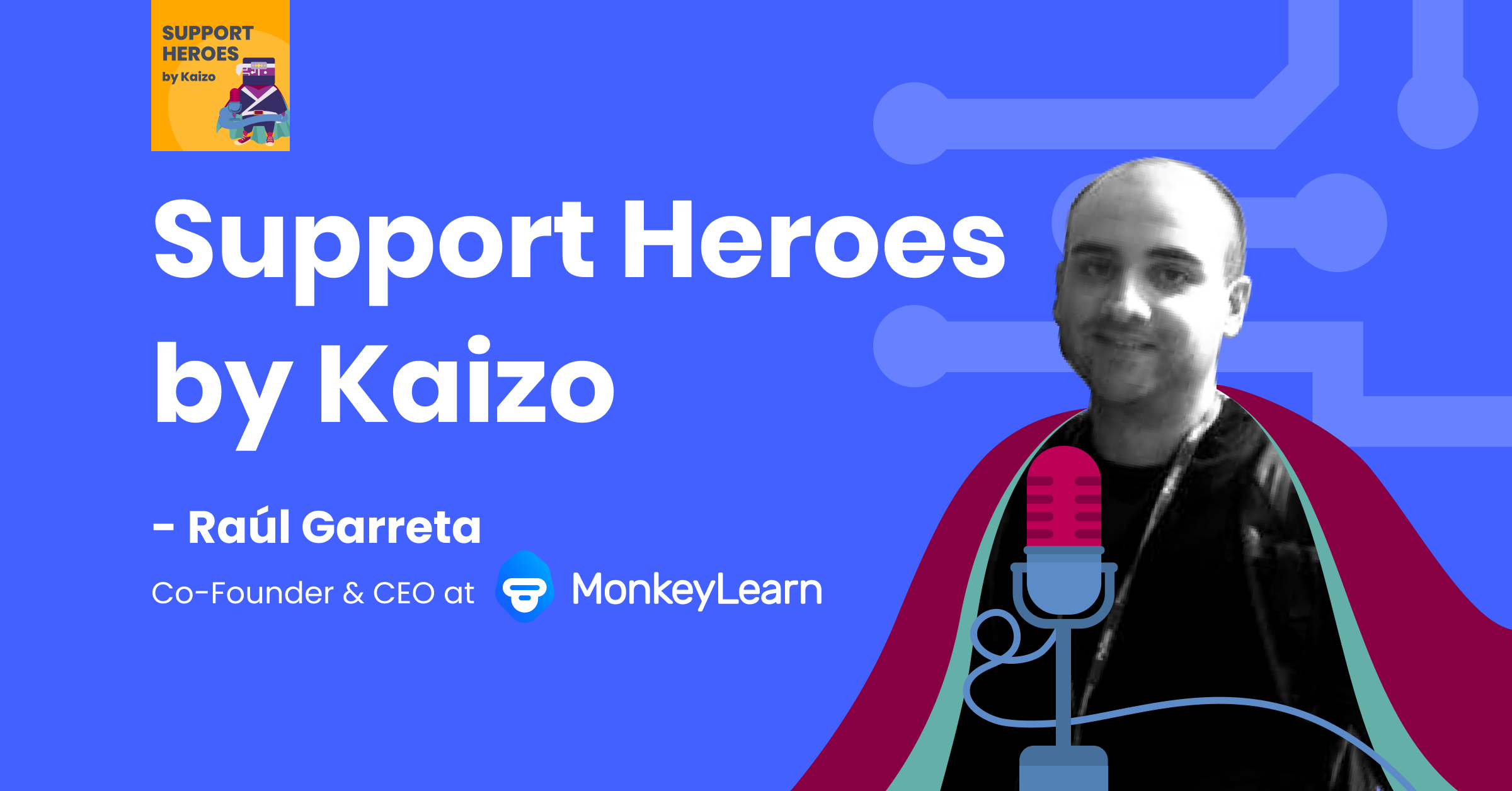Click ‘subscribe’ above to listen or download from Apple Podcast, Spotify, Google Podcast, and Amazon Music.
The twelfth release of Support Heroes by Kaizo featured Raúl Garreta- Co-Founder & CEO at MonkeyLearn.
Within the episode, we explore how support is being transformed by AI tools; how these tools are not a threat human agents but a tool to make their lives better; and how the insights that AI & Machine Learning can uncover from ticket data could blow static measures like NPS out of the water and place support as the centre-piece of customer research.
Key Takeaways
1. AI will not be replacing support agents
2. Will AI-assisted support processes become the new industry norm?
3. Support is a goldmine of customer data
AI will not be replacing support agents
“Repetitive, boring tasks should be automated”
Very few people find great joy in highly repetitive, standardised tasks. Not having to review hundreds of tickets manually will probably make someone’s day more enjoyable. Plus…
“Machines make mistakes but they make consistent mistakes”
Mistakes which are consistent can be easily identified, analysed and avoided. Asking humans to do a repetitive task introduces variance that cannot be accounted for.
If AI takes some of the load…
“Humans can find tasks that only humans can do…People want to talk with humans, they don’t want to talk with a chatbot.”
You want your agents talking to customers. You want your team leads managing and supporting the agents.
Freeing up the time of support staff allows them to focus on what they do best- providing great service.
“Machines are currently not equipped with the technology to create a response that a customer needs when the issue is complex”
“But [machines] can help route, organise, structure and analyse what’s happening so the humans can be more productive”
Raúl mentioned the industrial revolution, referencing that when industrial machinery was introduced to, for example, farming.
One farming family could suddenly produce so much more food with the same basic resources.
Will AI-assisted support processes become the new industry norm?
“Yes definitely. I think it’s just a matter of time. Of market adoption and evolution of the technology”
“This is the same as the pre and post-internet world…you don’t go back and it was only a matter of time”
The example Raúl gave was email and spreadsheets. After these tools were understood and adopted we never looked back.
It was only a matter of getting to the stage where everyone could use them. Equally, excel didn’t make accountants obsolete. It just made their jobs easier.
“The question is how to educate people so that they understand how to use the technology”
“Changing a workflow from the foundation in an existing company is pretty hard, especially if it’s a big company”
Surprisingly enough, Raúl didn’t quote price as being a barrier. Just that organisations need to do leg-work to put AI tools into practice and those most willing to do so, are usually the bigger companies who have greater operational strain.
“The start is automating steps in an existing workflow and then at some point, you get to a completely new and automated workflow where you can focus your human resources on the most critical parts.”
Support departments will ultimately become more efficient by letting humans focus on tasks they do best and letting machines do the repetitive tasks in support of their work.
Support is a goldmine of customer data
“At the end of the day, making [ticket] data available to everybody in a structured way is a game-changer”
Support is an unbelievably rich source of customer data. The challenge is when ticket volume is high, one can’t review every ticket and make use of its contents.
That’s where AI tools can help- by categorising data without having to make someone read every ticket.
“Manually classifying 10,000 tickets isn’t scalable”
In the same vein, the value of the data becomes self-evident when you compare the contextually rich ticket information with measures such an NPS…
“The nice thing about NPS is that it’s simple to implement and it’s simple to analyse- it’s just a number”
“The two problems are, 1. It’s just a number. You don’t know why you have a 10 or a 6… & 2. People rate the same experience differently”
The only way to know the “why” is the talk to customers. But it’s hard to talk to customers at scale…the one place that always talks to customers, however, is support.
Equally, support tickets have context and detailed descriptions. There’s far less ambiguity than with a 1-10 scale. You know exactly why someone was happy or dissatisfied because they tell you upfront.
“What a customer says in a public review or in an NPS comment after they used the product is very different from how they express themselves when they have the issue”
The second major advantage ticket data has over customer satisfaction scores is that the ticket data is given at the moment of pain.
Customers don’t have to retroactively evaluate their experience. They’re in the experience as they talk to support. The content of their conversation with support the most accurate representation of they felt.


